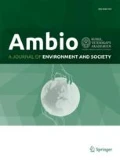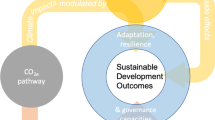Abstract
In this Perspective, we discuss whether in times of quickly proceeding global environmental change, radical global interventions like “climate engineering” may gain legitimacy in China and eventually be deployed or supported. We argue that one cornerstone for whether climate engineering, and solar radiation management in particular, could gain legitimacy in China, is its current weather modification programme. In China, weather modification is institutionalized and deployed on a large scale, and current narratives around the legitimacy to intervene into the local climate may provide a rationale for interventions such as solar radiation management. In the end, in the same way as Deng Xiaoping coined the phrase “stepping on stones to cross the river” in the era of China’s Industrial Civilization, narrating China's “Ecological Civilization” may want to make use of “seeding the clouds to reach the sky”. [See ESM for a summary of the article in Chinese.]
Similar content being viewed by others
Notes
Search of websites of the State Council, the National Development and Reform Commission, the Ministry of Environment and National Energy Agency, using the terms “qihou gongcheng” and “diqiu gongcheng” on 9 May 2018, and no entries were returned.
Thomson Reuters 2018, Practical Law UK Glossary, “Guiding opinion (zhidao yijian)”. https://uk.practicallaw.thomsonreuters.com/2-522-0010?originationContext=document&transitionType=DocumentItem&contextData=(sc.Default)&firstPage=true&comp=pluk&bhcp=1.
References
Beetham, D. 2013. The legitimation of power, 2nd ed. Basingstoke, United Kingdom: Palgrave.
Biermann, F., and I. Möller. 2019. Rich man’s solution? Climate engineering discourses and the marginalization of the global south. International Environmental Agreements: Politics, Law and Economics.. https://doi.org/10.1007/s10784-019-09431-0.
Brown, K., and U. Berzina-Cerenkova. 2018. Ideology in the era of Xi Jinping. Journal of Chinese Political Science 23: 323–339.
Cao, L., C.-C. Gao, and L.-Y. Zhao. 2015. Geoengineering: Basic science and ongoing research efforts in China. Advances in Climate Change Research 6: 188–196.
Central People’s Government of the People’s Republic of China. 2013. Xinhua News Agency is authorized to publish the 2013 central document no. 1 [Xinhuashe shouquan fabu 2013 nian zhongyang yi hao wenjian]. http://www.gov.cn/jrzg/2013-01/31/content_2324293.htm. Accessed 13 Nov 2018.
China Meteorological Agency Newspaper. 2015. Shen Xiaonong met with the Directors of the Mongolian Meteorological Administration and Environmental Monitoring Bureau [Shen Xiaonong huijian Menggu Guojia Qixiang Yu Huanjing Jiance Ju Juzhang], 14.07.2015. http://www.cma.gov.cn/2011xwzx/2011xqxxw/2011xqxyw/201507/t20150714_287914.html. Accessed 3 March 2019.
China Meteorological Agency Newspaper. 2018. Assist the building of a beautiful China—Climate science and technology support to build an ecological civilization [Zhuli Meili Zhongguo Jianshe—Wei Shengtai Wenming Jianshe Tigong Qixiang Keji Zhicheng]. China Meteorological Agency Newspaper, 18.05.2018. http://www.cma.gov.cn/2011xzt/2018zt/20180504/2018050413/201805/t20180518_468646.html. Accessed 23 May 2018.
CMA. 2011. Introduction to the China meteorological administration (Zhongguo Qixiang Jieshao). http://www.cma.gov.cn/2011zwxx/2011zbmgk/201110/t20111026_117793.html] Accessed 14 November 2018 (In Chinese).
Corner, A., K. Parkhill, N. Pidgeon, and N.E. Vaughan. 2013. Messing with nature? Exploring public perceptions of geoengineering in the UK. Global Environmental Change 23: 938–947.
Dimitrov, R.S. 2016. The Paris agreement on climate change: Behind closed doors. Global Environmental Politics 16: 1–11.
Edney, K., and J. Symons. 2014. China and the blunt temptations of geoengineering: The role of solar radiation management in China’s strategic response to climate change. The Pacific Review 27: 307–332.
Frankfurt School-UNEP. 2018. Global trends in renewable energy investment 2018. Frankfurt: Frankfurt School of Finance & Management gGmbH. http://fs-unep-centre.org/sites/default/files/publications/gtr2018v2.pdf. Accessed 23 May 2018.
Gao, J., K. Jiao, and S. Wu. 2018. Quantitative assessment of ecosystem vulnerability to climate change: Methodology and application in China. Environmental Research Letters 13: 094016.
Holbig, H. 2013. Ideology after the end of ideology. China and the quest for autocratic legitimation. Democratization 20 (1): 61–81.
Kiel Earth Institute. n.d. Risks, challenges, opportunities? Research to evaluate climate engineering. Priority Programme 1689 of the German Research Foundation (DFG). https://www.spp-climate-engineering.de/focus-program.html?file=files/ce-projekt/media/download_PDFs/spp_folderE_ph2_web.pdf. Accessed 08 Dec 2018.
Lane, L. 2013. Climate engineering and the Anthropocene Era. In Climate change geoengineering: Philosophical perspectives, legal issues, and governance frameworks, ed. W.C. Burns and A.L. Strauss. Cambridge: Cambridge University Press.
Liu, Z., and Y. Chen. 2015. Impacts, risks, and governance of climate engineering. Advances in Climate Change Research 6: 197–201.
Macnaghten, P., and B. Szerszynski. 2013. Living the global social experiment: An analysis of public discourse on solar radiation management and its implications for governance. Global Environmental Change 23: 465–474.
McLaren, D., K.A. Parkhill, A. Corner, N.E. Vaughan, and N.F. Pidgeon. 2016. Public conceptions of justice in climate engineering: Evidence from secondary analysis of public deliberation. Global Environmental Change 41: 64–73.
McLeod, C.M., H. Pu, and J.I. Newman. 2018. Blue skies over Beijing: Olympics, environments, and the People's Republic of China. Sociology of Sport Journal 35: 29–38.
Millard-Ball, A. 2012. The tuvalu syndrome: Can geoengineering solve climate’s collective action problem? Climatic Change 110: 1047–1066.
Ministry of Agriculture and Rural Affairs. 2012. The 2012 central document no. 1: The Central Committee of the Communist Party of China publishes ‘Several opinions related to accelerating the advancement of agricultural science and technology innovation and continuing to strengthen the capacity to protect agricultural product supply’ [2012 Nian Zhongyang Yi Hao Wenjian: Zhonggong zhongyang guowuyuan yinfa ‘guanyu jiakuai tuijin nongye keji chuangxin chixu zengqiang nongchanpin gongji baozhang nengli de ruogan yijian]. 30.08.2012. http://www.moa.gov.cn/ztzl/nyfzhjsn/zyhwj/201208/t20120830_2901691.htm. Accessed 13 Nov 2018.
Moore, J.C., Y. Chen, X. Cui, W. Yuan, W. Dong, Y. Gao, and P. Shi. 2016. Will China be the first to initiate climate engineering? Earth’s Future 4: 588–595.
Morrow, D.R., R.E. Kopp, and M. Oppenheimer. 2013. Political legitimacy in decisions about experiments in solar radiation management. In Climate change geoengineering: Philosophical perspectives, legal issues, and governance frameworks, ed. W.C. Burns and A.L. Strauss. Cambridge: Cambridge University Press.
NDRC and CMA. 2014. National weather modification development plan (2014–2020) [Quan Guo Rengong Yingxiang Tianqi Fazhan Guihua]. http://www.ndrc.gov.cn/zcfb/zcfbtz/201501/t20150112_659947.html.
Neslen, A. 2017. US Scientists Launch World’s Biggest Solar Geoengineering Study. The Guardian, 24.03.2017. https://www.theguardian.com/environment/2017/mar/24/us-scientists-launch-worlds-biggest-solar-geoengineering-study. Accessed 14 Nov 2018.
Office of the State Council. 2012. Opinion by the Office of the State Council about the further strengthening of weather modification operations [Guowuyuan Bangongting Guanyu Jinyibu Jiaqiang Rengong Yingxiang Tianqi Gongzuo de Yijian]. “Opinion” of the Office of the State Council [2012] No. 44. http://www.gov.cn/zwgk/2012-08/30/content_2213785.htm. Accessed 23 May 2018.
Qiao, Q. 2017. Xi Jinping’s ecological civilization ideology [Xi Jinping de Shengtai Wenming Sixiang]. Renminwang, 17.01.2017. http://theory.people.com.cn/n1/2017/0117/c352499-29030443.html. Accessed 14 Nov 2018.
Qiu, J., and D. Cressey. 2008. Taming the sky. Nature 453: 970–974.
State Council. 2002. Weather modification administrative regulation [rengong tianqi guanli tiaolie]. Order of the State Council of the People’s Republic of China, No. 348, implemented on 01.05.2002. http://www.cma.gov.cn/2011zwxx/2011zflfg/2011zxzfg/201110/t20111027_135237.html. Accessed 22 June 2018.
Sugiyama, M., T. Kosugi, A. Ishii, and S. Asayama. 2016. Public attitudes to climate engineering research and field experiments: Preliminary results of a web survey on students’ perception in six Asia-Pacific countries. PARI-WP no. 24, 2016. Tokyo: Policy Alternatives Research Institute, University of Tokyo. http://pari.u-tokyo.ac.jp/eng/publications/WP16_24.html. Accessed 06 May 2018.
Temple, J. 2017. China builds one of the world’s largest geoengineering research programs. MIT Technology Review, 02.08.2017. https://www.technologyreview.com/s/608401/china-builds-one-of-the-worlds-largest-geoengineering-research-programs/. Accessed 11 Feb 2018.
UNFCCC. 2015. Enhanced actions on climate change: China’s intended nationally determined contributions. Department of Climate Change, National Development and Reform Commission of China. http://www4.unfccc.int/Submissions/INDC/Published%20Documents/China/1/China’s%20INDC%20-%20on%2030%20June%202015.pdf. Accessed 08 July 2018.
Voigt, C., and F. Ferreira. 2016. Differentiation in the Paris agreement. Climate Law 6: 58–74.
Weng, W.L. and Chen. Y., 2014. A Chinese perspective on solar geoengineering. Geoengineering Our Climate Working Paper and Opinion Article Series, Opinion Article. http://wp.me/p2zsRk-a1. Accessed 05 May 2018.
Wu, P. 2016a. The Earth is warming at a speed never seen in millennia [Diqiu Zheng Yi Qiannian Lai Cong Wei Youguo de Sudu]. Bejing: China Meteorological Administration, 14.09.2016. http://www.cma.gov.cn/2011xwzx/2011xqxkj/qxkjgjqy/201609/t20160914_322485.html. Accessed 23 May 2018.
Wu, P. 2016b. Atmosperic aerosols can significantly cool the climate [Daqi qi rongjiao neng xianzhu shi qihou lengque]. Bejing: China Meteorological Administration, 07.06.2016. http://www.cma.gov.cn/2011xwzx/2011xqxkj/qxkjgjqy/201606/t20160607_313519.html. Accessed 23 May 2018.
Xinhua News Agency. 2018. Weather Modification: The technical support behind “calling the wind and summon the rain” [‘Hufenghuangyu’ beihou de keji zhicheng]. Xinhua 20.09.2018, source: Guangming Ribao. http://www.xinhuanet.com/politics/2018-09/20/c_1123456681.htm.
Author information
Authors and Affiliations
Corresponding author
Additional information
Publisher's Note
Springer Nature remains neutral with regard to jurisdictional claims in published maps and institutional affiliations.
Electronic supplementary material
Below is the link to the electronic supplementary material.
Rights and permissions
About this article
Cite this article
Bluemling, B., Kim, R.E. & Biermann, F. Seeding the clouds to reach the sky: Will China’s weather modification practices support the legitimization of climate engineering?. Ambio 49, 365–373 (2020). https://doi.org/10.1007/s13280-019-01180-3
Received:
Revised:
Accepted:
Published:
Issue Date:
DOI: https://doi.org/10.1007/s13280-019-01180-3




